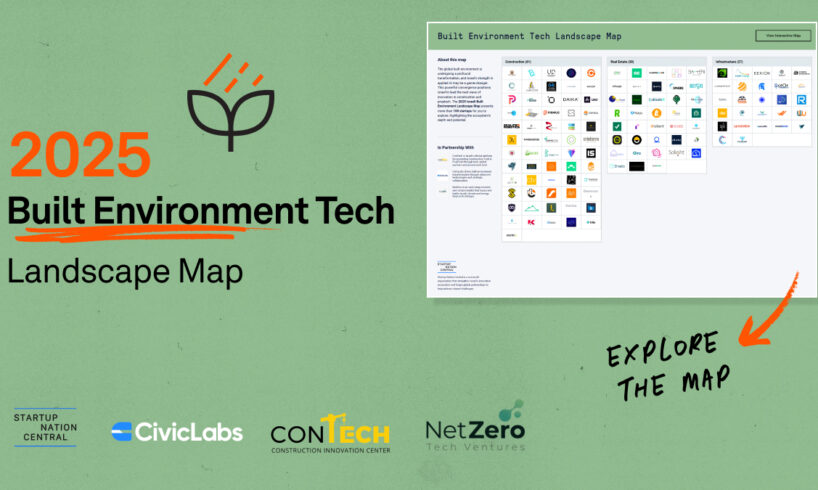
Contributors:
Alon Turkaspa, Director Global Partnerships Startup Nation Central
Yogev Katzir, CEO & Rosie Shapiro, VP Partnerships CivicLabs
Shirly Braitner, CEO ConTech
Chen Rosen, Managing Partner-VP Business Development & Innovation Reality Group
Yael Weiss Zilberman, VP NetZero Ventures
The Built Environment Map highlights the startups, technologies, and partners driving transformation across construction, real estate, infrastructure, and urban systems. As the global sector faces pressure to become more sustainable, digital, and resilient, this map showcases how Israeli innovation is shaping the future of how we build and live.
With over 300 active startups and deep collaboration across academia, industry, and government, Israel offers one of the world’s most concentrated and agile ecosystems for built environment innovation. The map reflects this momentum, capturing the full stack of solutions, from AI-driven planning and robotics to energy systems, advanced materials, and PropTech platforms, that are redefining urban life.
Global Shifts & Sector-Specific Impact in Built Environment Tech
Globally, the built environment tech sector is undergoing a transformative phase driven by climate urgency, labor shortages, and rapid digitalization. The global construction industry, valued at over $12 trillion, has historically lagged in productivity and technology adoption. That is changing quickly.
Climate change is now one of the most powerful forces driving innovation. Government-led megaprojects in regions like the Gulf, such as NEOM and The Line, along with the EU’s Green Deal, are channeling billions into sustainable infrastructure, green buildings, and clean energy retrofits. However, the return of Donald Trump to the U.S. presidential race and his stated opposition to climate-focused policies has introduced uncertainty around federal funding for green infrastructure. This may slow momentum in North America.
Meanwhile, AI-powered tools are rapidly integrating into every part of the construction value chain. Generative design platforms, chatbots for tenant engagement, and predictive analytics for risk management are no longer experimental. These technologies are being built into standard SaaS offerings across the sector.
As in Israel, startups globally continue to face challenges in scaling. Fragmented procurement policies, low IT budgets, and conservative industry norms limit growth. Venture capital is flowing with more than $50 billion invested in AEC tech between 2020 and 2022, according to McKinsey. However, many technologies still stall between pilot phase and full-scale implementation.
Robotics, automation, and modular construction are also gaining traction, especially in Asia-Pacific and Scandinavia where public investment and regulatory flexibility support innovation. The global race is about inventing tools and scaling them across the value chain.
As Startup Nation Central Director of Global Partnerships, Alon Turkaspa, puts it:
“In tomorrow’s cities, buildings won’t just use energy, they’ll make it. With solar built right into rooftops and walls, real estate will help power the AI systems we rely on. Cities will manage power from EVs, solar panels, and storage like a living, breathing grid. And as AI eats up more electricity, smart investors will start valuing buildings based on the energy they produce and not solely on square footage.”
– Alon Turkaspa
Israel’s Value Proposition
This global shift in built environment tech shift driven by the urgent need for sustainability, digitalization, and new models of urban living. While global markets have traditionally led in large-scale infrastructure innovation, Israel has rapidly emerged as a powerhouse for PropTech and construction innovation, where agility, cross-sector collaboration, and cutting-edge technology converge.
Israel’s influence is outsized. With more than 300 startups active across construction tech, real estate innovation, infrastructure, and environmental solutions, its per-capita startup density in this sector is more than five times higher than in the US or Europe. Cross-sector innovation is a defining trait of the ecosystem. Israeli entrepreneurs are known for applying defense, health, cyber, and agricultural technologies to real estate and construction problems, creating new categories and export-ready solutions. The result is a wave of scalable innovation positioning Israel at the forefront of the global race to build smarter, greener, and more resilient cities.
“Israel’s density of construction tech startups is not a coincidence; it’s a signal to global investors that the future of the built environment is being prototyped here. Smart investors are no longer betting on buildings, they’re backing the platforms and protocols that will shape tomorrow’s cities, and from sand to sensor, Israeli startups are digitizing the full lifecycle of construction and real estate.”
– Rosie Shapiro, VP Partnerships, CivicLabs
Key areas of Israeli leadership include:
AI and robotics for construction automation
Smart city platforms, digital twins, and urban mobility innovation
Energy-efficient and climate-resilient building systems
Advanced materials, 3D printing, and modular construction
PropTech solutions redefining property management, ownership models, and tenant experiences
Built Environment Partner Spotlights
NetZero Ventures: Climate Meets Construction
Construction accounts for nearly 40% of global carbon emissions. Despite this, it remains one of the most underfunded climate innovation verticals.
Innovation for the construction industry (ConTech) is a critical lever in the global effort to decarbonize both the built environment and the industries that enable it. Buildings and construction account for nearly 40% of global carbon emissions, making it one of the most impactful, yet underfunded, sectors in the climate innovation landscape. For a climate- and energy-focused venture builder VC like NetZero Ventures, construction tech represents a unique opportunity to back bold, scalable technologies that lower lifecycle emissions while tapping into large markets. We are particularly paying close attention and increasing our active involvement in areas like lower carbon cement and steel production, greener materials, cooling & heating innovation, energy optimization, and integration of storage or renewable systems in buildings.
Israel’s technology ecosystem offers unique advantages in the construction-sustainability nexus. Decades of leadership in advanced materials science, electrochemistry, sensors, AI, robotics, and digital twins have created a strong foundation for breakthrough ConTech innovation. Combined with world-class academic institutions, a vibrant entrepreneurial culture, and growing collaboration with global corporates, Israeli startups are well positioned to develop scalable solutions for reducing emissions across the entire construction value chain, from green materials to smarter buildings and resilient urban infrastructure. This convergence makes Israel an emerging hub for next-generation climate and construction technologies.
At the same time, we recognize the structural barriers ConTech startups face, which are shared by other deep tech startups, long sales cycles, fragmented stakeholders, conservative procurement and regulations. That’s why we believe that climate-focused VCs must not only bring capital but also help forge partnerships with industry to de-risk scale up processes. In this sense, NetZero’s approach to ConTech is the same as our broader philosophy: venture building with a systems mindset, bridging R&D processes with product-market-fit processes, and creating early market traction to accelerate real-world impact.
“Our approach to ConTech is the same as our broader philosophy, namely venture building with a systems mindset, accelerating early traction and long-term emissions reduction.”
– Yael Weiss
CivicLabs: Built Environment Pilots, Platforms, and Practical Impact
Despite geopolitical challenges and a cautious investment climate, Israel’s built environment tech sector continues to demonstrate resilience and adaptability.
The local ecosystem remains diverse, with deal flow that includes both deep-tech solutions (such as robotics, sensors, and material science) and AI-powered applications tailored for planning, project management, and predictive maintenance.
That said, raising capital has become substantially more difficult, particularly for early-stage startups that require longer runways and don’t offer rapid go-to-market potential. According to IVC and Startup Nation Central, early-stage funding in Israel dropped by nearly 50% in 2023 compared to the previous year, a trend felt acutely across construction-tech ventures. Investors are now placing greater emphasis on revenue, real-world traction, and capital efficiency, making it harder for “visionary” startups without immediate commercial validation.
A persistent shortage of skilled labor across the construction sector is pushing general contractors and developers to pilot and adopt innovative solutions at a faster pace. This includes modular construction platforms, site automation, and increasingly, AI agents developed in-house or in partnership with startups, a novel trend that blurs the line between construction and software R&D.
Yet, scaling remains a hurdle. Many promising startups struggle to move beyond POCs into full-scale deployment, due to procurement barriers, fragmented regulatory frameworks, and conservative industry culture. Despite these frictions, Israeli companies like Buildots, Guesty, Rapida, Exodigo Qubiq, and StructShare are showing the way forward, successfully integrating into Tier 1 contractors globally. CivicLabs is an innovation platform focused on transforming the built environment through advanced technologies and strategic collaboration. We connect startups, industry leaders, and public stakeholders to pilot and scale impactful solutions in construction, infrastructure, and urban development.
“Israel’s built environment tech is resilient, AI-driven, and solution-focused. But scaling still takes more than good tech, it takes partnerships and persistence.”
– Yogev Katzir, CEO Civic Labs
ConTech: Israel’s Construction Innovation Community
Over the past two years, Israel’s construction industry has faced significant disruption following the outbreak of the war in late 2023.
Large-scale projects were delayed, capital flows slowed, and uncertainty affected both developers and contractors. These challenges added to existing structural issues, including an ongoing labor shortage and the industry’s well-known difficulty in adopting innovation within a traditionally conservative sector.
Naturally, the construction-tech ecosystem felt the impact: investment volumes declined, international partnerships were paused, and the number of active startups in the sector dropped from around 250 in 2023 to approximately 150 today.
And yet, the ecosystem has shown a degree of resilience. Many Israeli startups continue to push forward with cutting-edge solutions in AI-driven planning, robotics, automation, advanced materials, and off-site construction adapting to evolving needs and remaining relevant.
Meanwhile, the global Construction Tech sector has continued its steady growth, driven by the increasing demand for efficiency, sustainability, and digital transformation in the built environment. Innovation in construction is no longer considered a luxury, but a necessity.
In Israel, too, key stakeholders including government agencies, contractors, and investors are showing greater alignment around the urgency of adopting scalable technologies to overcome inefficiencies and reduce reliance on manual labor.
Despite the complex environment, Israeli Construction Tech remains ambitious and well-positioned to make a meaningful contribution to the future of construction both at home and globally.
ConTech is Israel’s leading Construction Innovation Community, dedicated to promoting investment in and adoption of advanced technologies, new materials, and modern building methods across the construction and real estate sectors. Operating in close collaboration with the Israel Builders Association, the Ministry of Construction and Housing, and the Israel Innovation Authority, ConTech serves as a strategic connector between startups, industry players, public institutions, and investors.
“Even amid contraction, Israeli construction tech is adapting. The next wave of startups will be leaner, sharper, and more integrated into global infrastructure needs.”
– Shirly Braitner, CEO ConTech
Reality Group: Institutional PropTech
In recent years, and especially over the past two, artificial intelligence has begun transforming the real estate industry in profound ways.
AI is reshaping entire workflows and unlocking breakthrough solutions across every part of the value chain. The ability to harness the massive volumes of data accumulated by real estate owners, developers, and operators and convert them into actionable insights is enabling the sector to scale development, planning, and execution at unprecedented speed and scope.
In parallel, rising living costs and surging property prices around the world are accelerating demand for robotics and automation that can streamline construction, reduce timelines, and cut labor costs.
Given these trends, we believe PropTech will become one of the leading verticals in global venture capital. In fact, this shift is already underway and we expect it to intensify significantly in the coming years.
Reality Group is Israel’s largest real estate investment fund and one of its early champions of PropTech. In 2019, it hosted Israel’s first real estate innovation hackathon. That effort evolved into the country’s first PropTech accelerator, launched in partnership with PropTech Zone.
Today, the group runs a dedicated venture arm, Reality PropTech, investing in startups across AI planning, automation, smart energy, and tenant experience platforms.
“We believe PropTech will become one of the leading verticals in global venture capital. This shift is already underway and we expect it to intensify significantly.”
– Chen Rosen
Looking Ahead
The built environment is more than physical space, it includes energy, data, mobility, resilience, and climate. A sector once defined by slow cycles and rigid processes is being reshaped by urgency, innovation, and systems thinking. Israel plays a central role in this transformation.
From deep-tech startups and research institutions to venture builders and developers, Israeli players are breaking down silos to rethink how cities are designed, built, and operated. They are creating technologies and models that move quickly in an industry known for inertia.
Challenges still exist. Capital remains limited, regulations are complex, and adoption can be slow. Even so, the momentum is clear. Cross-sector collaboration, field-tested pilots, and strategic partnerships are pushing solutions forward. The companies that succeed will be those that align climate targets with construction timelines and connect financial performance to sustainability goals.
This moment is about building what comes next and doing it right, and Israel has a leading advantage.





